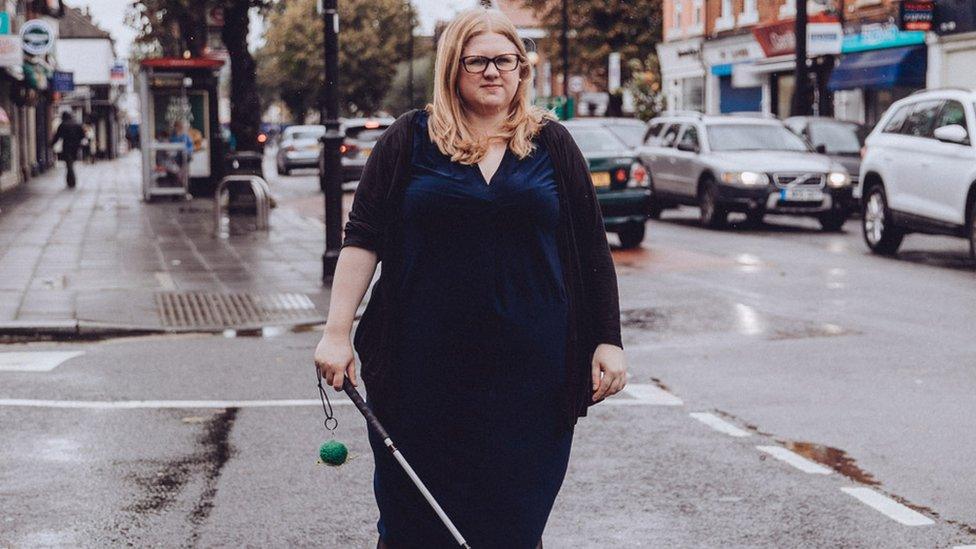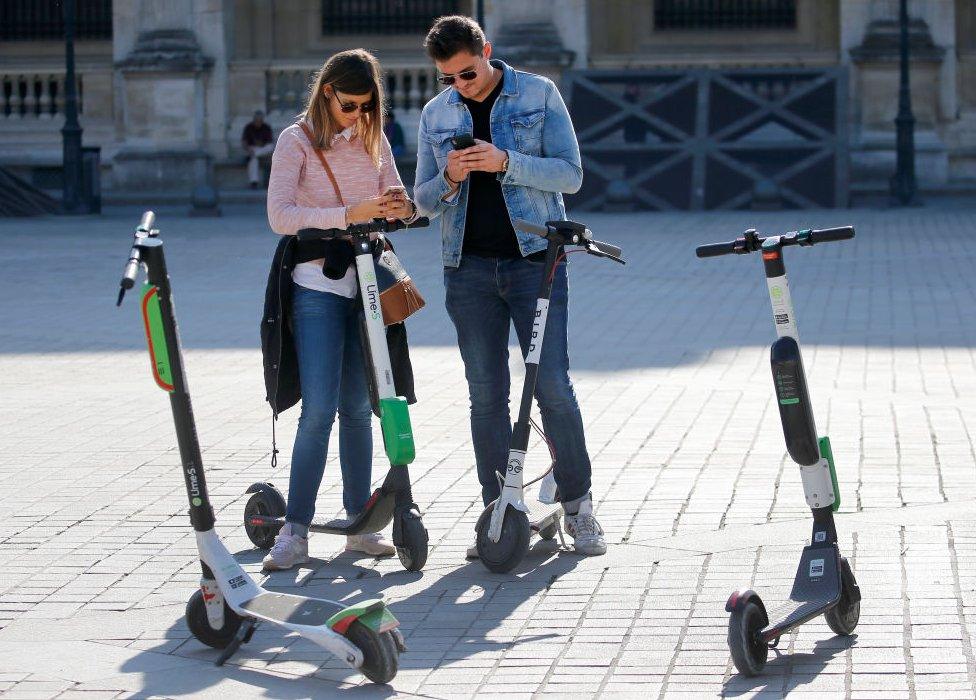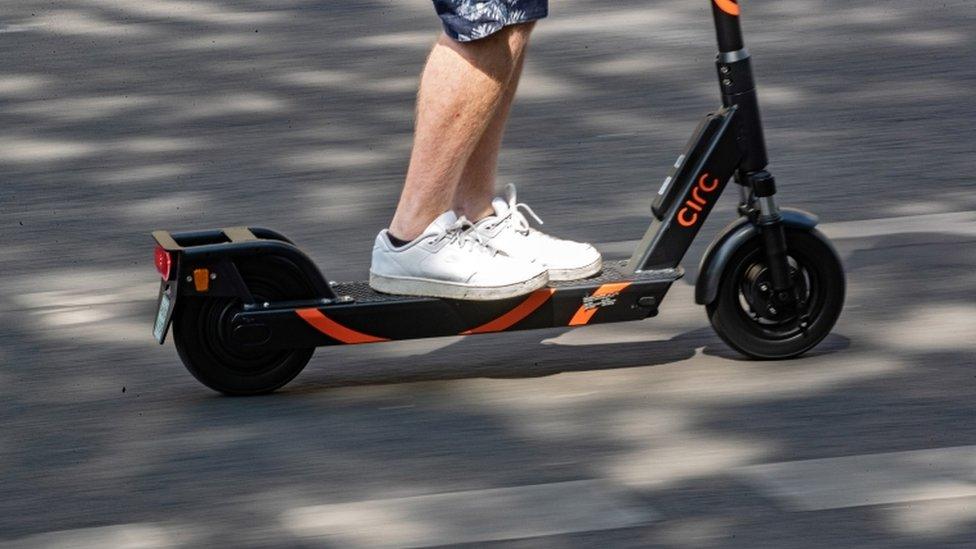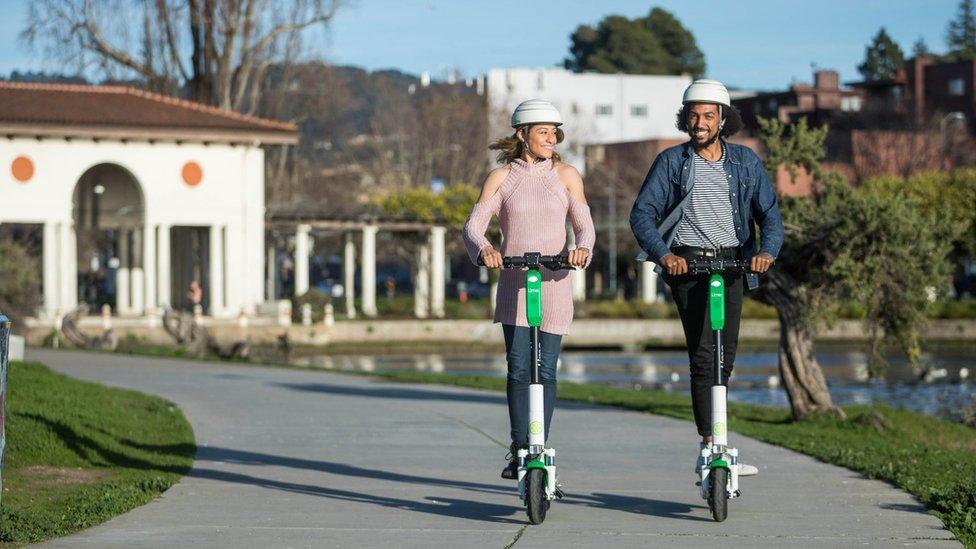Why do some people fear change to e-scooter laws?
- Published

Disability campaigner Dr Amy Kavanagh is worried about e-scooters blocking streets in London
The government is to hold a consultation on the use of e-scooters, currently banned on public roads, pavements and cycle lanes. Campaigners have called for tighter regulations, but would people welcome a law change?
"The possibility of them being made legal is terrifying," says visually impaired campaigner Dr Amy Kavanagh.
The 30-year-old, who uses a white cane when travelling around London, says she fears people will use e-scooters on pavements, even if they are only made legal to ride on roads and cycle lanes.
"I would have to be constantly prepared for getting injured," she says, adding that she has previously encountered e-scooters on footways on her commute to work in north London, some driven "at speed".
Electric scooters have become a familiar sight in US and European cities such as Los Angeles and Paris, where companies including Lime, Bird and Uber offer the vehicles to hire via a smartphone app.
Such schemes are not currently possible in Britain, as e-scooters are only legal on private land. But the Department for Transport is conducting a review into the laws that govern roads.
This includes a consultation in the coming months on the use of e-scooters - although this does not mean that the law will necessarily change.

Lime and Bird both offer e-scooters for hire in cities such as Paris
Electric scooters are defined as "powered transporters", external, and are covered by the same laws that apply to motor vehicles.
The vehicles are available to buy online and in stores, but riders face a £300 fixed-penalty notice and six points on their driving licence for using them on the road or pavement.
In recent years, they have drawn controversy - having been involved in a number of traffic accidents.
Last year, television presenter Emily Hartridge, 35, was riding an electric scooter when she was killed in a collision with a lorry in south London.
Her boyfriend Jake Hazell, 27, told BBC London on Wednesday that he feels more regulations need to be brought in so "no-one else loses their life on an e-scooter again".

Emily Hartridge, who was involved in the UK's first fatal e-scooter crash, with her boyfriend Jake Hazell
Scooter-sharing schemes, which grew significantly in popularity in the late 2010s, have also faced criticism. Dumped scooters have become a significant problem in Paris, where some 15,000 scooters are available for hire.
Dr Kavanagh expressed concern over the introduction of the schemes in London, having previously been injured by dockless e-bikes blocking pavements in the capital.
She said her blind friends in the United States have complained about e-scooters "piled up near train stations". "They say they fall over them and their guide dogs don't know what to do."
"If they insist on bringing them in here, there has to be designated parking from the beginning."
She would also feel more comfortable if speed limits were introduced as part of regulations.
The campaigner currently chooses to take the bus, rather than walk 10 minutes from the Tube to her office, as she is worried about her white cane colliding with a fast-moving e-scooter.
"I can't see detail more than two or three metres ahead of me," she says. "My cane moves from side to side - if they don't judge where it is moving, can you imagine the collision?
"I keep a spare cane at work in case one rides over mine and breaks it."
'Fun and efficient'
Advocates for electric scooters say they offer an environmentally-friendly alternative to cars, cutting down on congestion and air pollution.
Technology companies have been pushing for the vehicles to be allowed in the UK, including Californian electric scooter business Bird, which launched a pilot service on private land in London's Queen Elizabeth Olympic Park in 2018.
Harry Porter, from Bird's communications team, says customers tend to make journeys around three miles long, often to their nearest transport hub. "It gets people around quicker so they are not waiting in traffic," he explains.
The company "does not want people to ride on pavements", and he says those that do can be banned from using the company's app, while all Bird's scooter speeds are capped at 15 mph.

Electric scooters like this one have become a common sight in the UK - despite current regulations
Also among those hoping for a change in the law is Milton Keynes Council, which has been vying for the area to become a "test bed" for the vehicles.
Oliver Waters, 34, who has lived in the town centre for 10 years, says electric scooters would be a "fun and efficient" way to make short journeys in the area, such as to the station, and may free up parking spaces if local residents choose to leave their cars at home.
Meanwhile, others argue that e-scooters offer people living in rural areas an alternative to public transport. Paul Frost, an art director from Pontypool, Wales, says e-scooters could be used instead of the bus in his area.
The 49-year-old says there is "a lack of decent information" on his local public transport network, so he often resorts to taking a taxi or using his car.
"It could now be a choice of getting a taxi, seeing if a bus turns up or one of these e-scooters," he says.
Possible regulations
Safety campaigners and transport charities in the UK have called for greater regulation as e-scooters continue to grow in popularity.
Rachel White, of cycling and walking charity Sustrans, says any change to UK law "needs to prioritise the safety of all road users, especially those using them".
She stresses that the group does not support allowing electric scooters on footpaths.
"They belong on the road," she adds. "But we think they belong on protected cycle lanes because they don't mix well with motor traffic."
Roger Geffen, of Cycling UK, stresses the importance of "defining e-scooter regulations such as limiting their maximum speed and power output".
Meanwhile, the Royal Society for the Prevention of Accidents said the consultation should consider "determining if e-scooters should classified as a vehicle, whether wearing a helmet and having lights will be mandatory and if there ought to be a minimum legal age to ride an e-scooter".
A Department for Transport spokeswoman said: "Safety is at the heart of our road laws, and people who use e-scooters need to be aware it is currently illegal to ride them on the road and the pavement.
"The government is considering the use of e-scooters and e-skateboards as part of a regulatory review, as announced in March."
- Published10 January 2020

- Published12 November 2019
